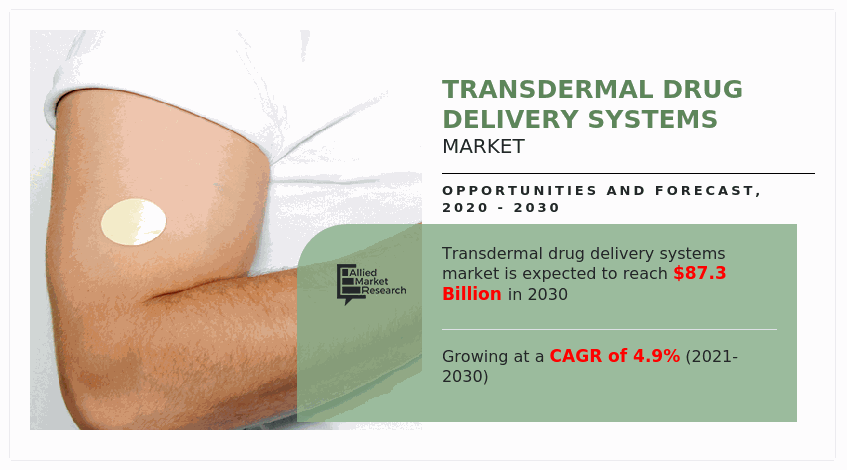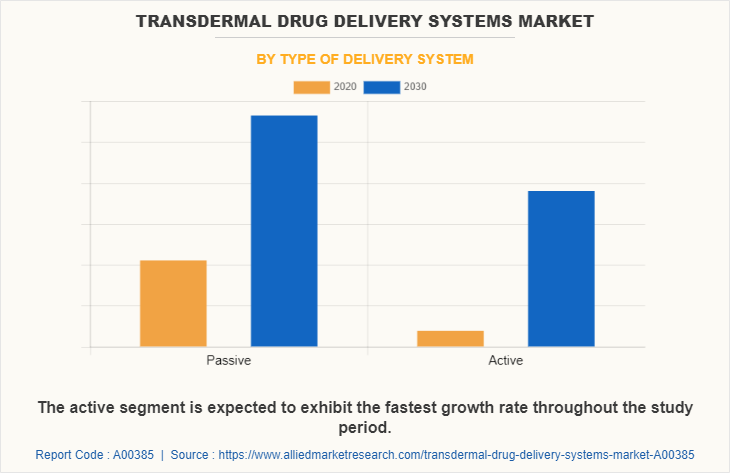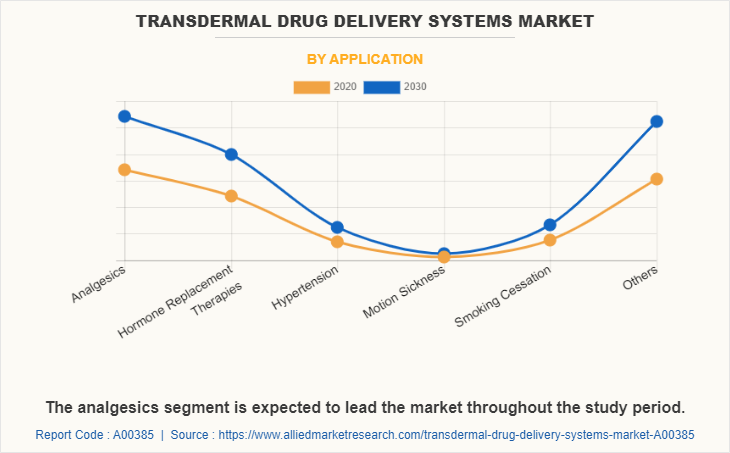Transdermal Drug Delivery Systems Market Statistics, 2030
The global transdermal drug delivery system market size was $52,476.50 million in 2020, and is projected to reach $87,322.40 million by 2030, growing at a CAGR of 4.9% from 2021 to 2030. Transdermal drug delivery systems are an alternative to oral intravascular, subcutaneous, and transmucosal routes, wherein the drugs are delivered through the skin for therapeutic use. Transdermal drug delivery systems offer a painless method of systematic drug delivery by application of drug onto an intact and healthy skin.

The rise in global population has significantly increased the demand for geriatric medicines. Transdermal drug delivery systems help deliver drugs in a controlled manner, thereby increasing the effectiveness of geriatric medicines. Furthermore, the number of patients suffering from chronic diseases, such as heart diseases, diabetes, and arthritis has significantly increased in the past few decades. Such chronic diseases are a leading cause of disability and deaths globally. These factors have increased R&D activities that are aimed to enhance the effectiveness of medicines. In addition, awareness amongst patients, regarding the use of various medicines has also increased. These factors have positively influenced the transdermal drug delivery systems market growth.
According to Department of Economic and Social Affairs, United Nations, the total number of people aged 60 years and above was 962 million in 2017, which is more than twice as large as it was in 1980 when there were around 382 million globally. Furthermore, the number of older persons is expected to double again by 2050, nearly reaching 2.1 billion. This s expected to propel the demand for geriatric diseases, thereby positively influencing the transdermal drug delivery systems market. According to Centers for Disease Control and Prevention, an entity of the U.S. Department of Health & Human Services, 6 in every 10 American adults have a chronic disease and 4 in every 10 American adults have two or more chronic diseases. This has significantly increased the spending on healthcare services. According to the U.S. Centers for Medicare & Medicaid Services, the U.S. healthcare spending reached $4.1 trillion or $12,530 per person, witnessing a rise of 9.7%, and accounting for 19.7% of GDP in the U.S. in 2020.

The novel coronavirus (COVID-19) has rapidly spread across various countries and regions, causing an enormous impact on the lives of people and the overall community. It began as a human health condition and has now become a significant threat to global trade, economy, and finance. The COVID-19 pandemic increased the importance of government healthcare facilities, thereby increasing healthcare spendings across the globe. Furthermore, the number of COVID-19 cases are expected to reduce in the near future as the vaccine for COVID-19 is introduced in the market. This has led to the reopening of transdermal drug delivery system research facilities at full-scale capacities. This is expected to help the market to recover by the start of 2022. After COVID-19 infection cases begin to decline, companies involved in manufacturing of transdermal drug delivery systems must focus on protecting their staff, operations, and supply networks to respond to urgent emergencies and establish new methods of working.
Furthermore, transdermal drug delivery systems offer additional advantages, such as maintaining an adequate concentration of drug in the blood for an extended period of time. It can be discontinued easily by peeling off the patch. In addition, transdermal drug delivery systems can be easily used in infants, elderly people, and patients suffering from dysphagia. Also, advancements in technology have enabled application of transdermal drug delivery systems for a wide range of medications.

The transdermal drug delivery systems market is segmented on the basis of type of delivery, application, and region. By type of delivery, the market is categorized into passive, active, and others. On the basis of application, it is categorized into analgesics, hormone replacement therapy, hypertension, motion sickness, smoking cessation and others. Region-wise, the market is analyzed across North America, Europe, Asia-Pacific, and LAMEA. North America held the largest transdermal drug delivery systems market share in 2020, and is anticipated to maintain this trend throughout the forecast period. This is attributed to increase in population and rise in spending of healthcare facilities.
By Region
North America holds the dominat position throughout the study period.
Key Benefits for Stakeholders
- The report provides an extensive analysis of the current and emerging transdermal drug delivery systems market trends and dynamics.
- In-depth transdermal drug delivery systems market analysis is conducted by constructing market estimations for key market segments between 2021 and 2030.
- Extensive analysis of the transdermal drug delivery systems market size is conducted by following key product positioning and monitoring of top competitors within the market framework.
- A comprehensive analysis of all the regions is provided to determine the prevailing transdermal drug delivery systems market opportunities.
- The global transdermal drug delivery systems market forecast analysis from 2021 to 2030 is included in the report.
- The key players within transdermal drug delivery systems market are profiled in this report and their strategies are analyzed thoroughly, which help understand the competitive outlook of the transdermal drug delivery systems industry.
Transdermal Drug Delivery Systems Market Report Highlights
| Aspects | Details |
| By Type |
|
| By APPLICATION |
|
| By Region |
|
| Key Market Players | Boehringer Ingelheim GmbH, Johnson & Johnson, Viatris Inc., Bayer AG, GlaxoSmithKline plc, Purdue Pharma L.P., Endo International plc, Novartis AG, Hisamitsu Pharmaceutical Co. Inc., Altaris |
Analyst Review
The transdermal drug delivery systems market witnessed significant growth in past few years, owing to rapid growth of pharmaceutical industry across the globe and increase in spending on healthcare facilities in developing countries.
Rise in demand for pharmaceutical products fueled by increase in global population and rise in number of lifestyle diseases boosted the demand for transdermal drug delivery systems in the pharmaceutical industry. Furthermore, rise in geriatric populations created a rise in demand for effective drug delivery systems. Also, use of transdermal delivery system helps in controlling the dosage of drug to be given, and proves to be significantly more effective for analgesics. In addition, medication from transdermal drug delivery systems can easily be discontinued by peeling off the patch.
Moreover, supportive government initiatives and rapid growth of the pharmaceutical industry in emerging countries provide lucrative growth opportunities for the transdermal drug delivery systems market.
North America is the largest regional market for transdermal drug delivery system.
Business expansion is key growth strategy of transdermal drug delivery system industry players
Altaris, Johnson & Johnson, GlaxoSmithKline plc and Hisamitsu Pharmaceutical Co. Inc. are some of the top companies to hold the market share in transdermal drug delivery system.
The company profile has been selected on factors such as geographical presence, market dominance (in terms of revenue and volume sales), various strategies and recent developments.
In 2020, $52,476.5 million is the estimated industry size of transdermal drug delivery system.
Loading Table Of Content...



